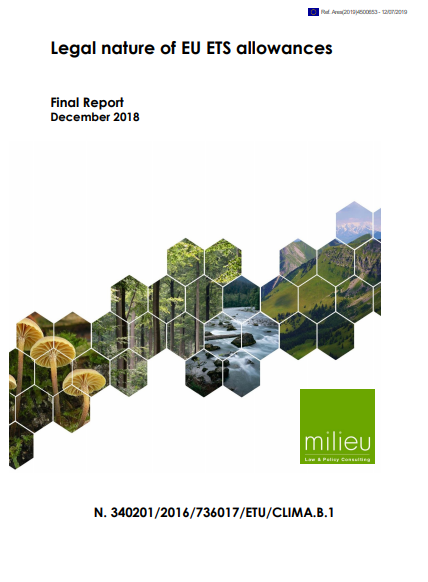Legal Nature of EU ETS Allowances
Final Report
- Publication
- Citation
Riedel, Arne et al. (2019): Legal nature of EU ETS allowances. Milieu Ltd, Ecologic and Klimapolitika. European Commission’s Directorate General CLIMA. Luxembourg.
The objective of this project is to provide clarity on the legal nature of the allowances of the EU Emission Trading System (EU ETS) excluding the international carbon units (e.g. assigned amount units (AAUs), certified emission reductions (CERs), emission reduction units (ERUs)) pursuant to the Kyoto Protocol to the UN Framework Convention on Climate Change (UNFCCC).
In line with the project specifications, the study aims to:
- Outline the characteristics of allowances which are typical of private property rights, administrative rights or sui generis rights, based on current EU legislation, national Member State regimes, and case law.
- Provide a detailed legal analysis of the treatment of allowances in five selected Member States: Belgium, Germany, France, Poland and the UK. This analysis is based on Article 21 reports, literature desk research and interviews with relevant authorities and stakeholders.
- Identify the main issues relating to the legal nature of allowances which may have practical implications on the legal certainty, investment confidence and liquidity of the carbon market.
- Consider the following aspects of the legal nature of allowances in order to determine their impact on the legal nature of the ETS allowances: property rights, establishing security interest, insolvency, taxation, accounting, and criminal justice.
- Identify the consequences of recognising the allowances as financial instruments under MiFID II, with respect to the legal nature of the allowances.
- Present options for further clarification of the legal nature of allowances in view of the abovementioned issues, and propose solutions, including changes to the relevant legal framework or soft law measures.
The options and tools should be analysed for their feasibility, benefit and effort required. The study is also intended to address the European Court of Auditors’ report, which highlighted the need for a clearly defined and harmonised definition of the legal nature of the allowances, as the current lack of definition at EU level might affect the legal certainty and liquidity of the market.




